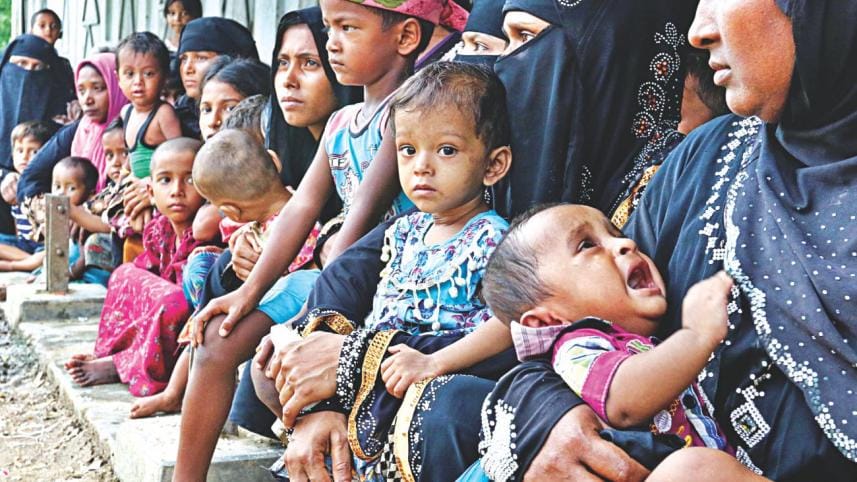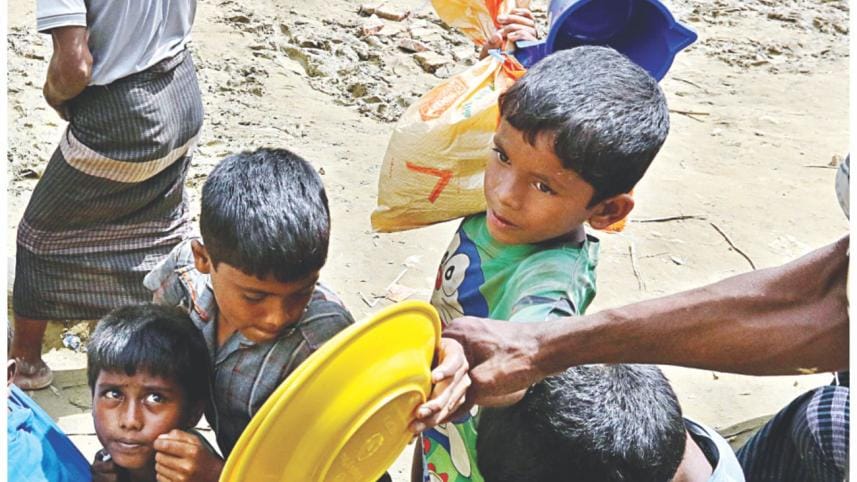WFP to help feed 5 lakh Rohingyas

The World Food Programme will provide food support to the five lakh Rohingyas, who have fled to Bangladesh to escape violence in Myanmar's Rakhine state, until they are repatriated, Relief and Disaster Management Minister Mofazzal Hossain Chowdhury Maya yesterday said.
It will also give special food for children and pregnant women, he told reporters after a meeting with WFP Executive Director David Beasley at Westin Hotel in the capital.
For the time being, the displaced Myanmar nationals will be sheltered in Cox's Bazar, but if their repatriation is delayed, they would be shifted to Bhashanchar of Noakhali where Bangladesh Navy is developing land.
"Cox's Bazar is a tourist area. We have to protect it. Besides, there are safety issues," Maya said, explaining why the Rohingyas would probably be relocated.
Asked if the refugees were getting all the basic things they needed in the camps, the minister avoided giving a direct answer but said, "No one has died of food shortage."
The government is working with the international community to increase pressure on Myanmar for fast repatriation of the Rohingyas. "We are not alone. The whole world is with us," Maya added.

WFP official David Beasley said the world leaders need to do "everything possible" to pressure the Myanmar government and other actors into solving the problem diplomatically so that the refugees from Myanmar can go back home.
"The other most important task now for the international community is to support Bangladesh so that Bangladesh does not bear the burden of the refugees alone," said the WFP official on a visit from Geneva to see the Rohingya crisis.
"We are very proud that Bangladesh has been so cooperative to every one of us ... ," he said.
1,300 LEARNING CENTRES
The UN Children's Fund will establish over 1,300 learning centres for Rohingya children who have fled violence.
Currently, the Unicef runs 182 learning centres at Rohingya camps and makeshift settlements in Cox's Bazar with 15,000 children enrolled.
"It plans to increase the number of learning centres to 1,500" over the next year to facilitate education of 2 lakh children, a statement issued yesterday.
"These children, who have suffered so much in this crisis, should have access to education in a safe and nurturing environment," said Unicef representative in the country Edouard Beigbeder, so that they get a future to look forward to.
CHOLERA VACCINE
The International Coordinating Group on Vaccine Provision will release 900,000 doses of the Oral Cholera Vaccine from the global stockpile to prevent the spread of cholera among Rohingya refugees and host communities in Cox's Bazar.
The ICG, a coordinating body of the World Health Organisation, Unicef, Médecins Sans Frontières, and the International Federation of the Red Cross, approved the appeal in 24 hours after Bangladesh government's request on September 27.
ICG partners – with support from Gavi, the Vaccine Alliance – will deliver 900,000 doses of OCV to Bangladesh within two weeks for an immunization campaign due to start in October, says a press release of the WHO yesterday.
 For all latest news, follow The Daily Star's Google News channel.
For all latest news, follow The Daily Star's Google News channel.
Comments